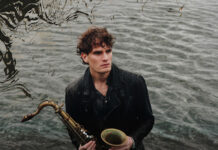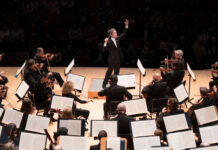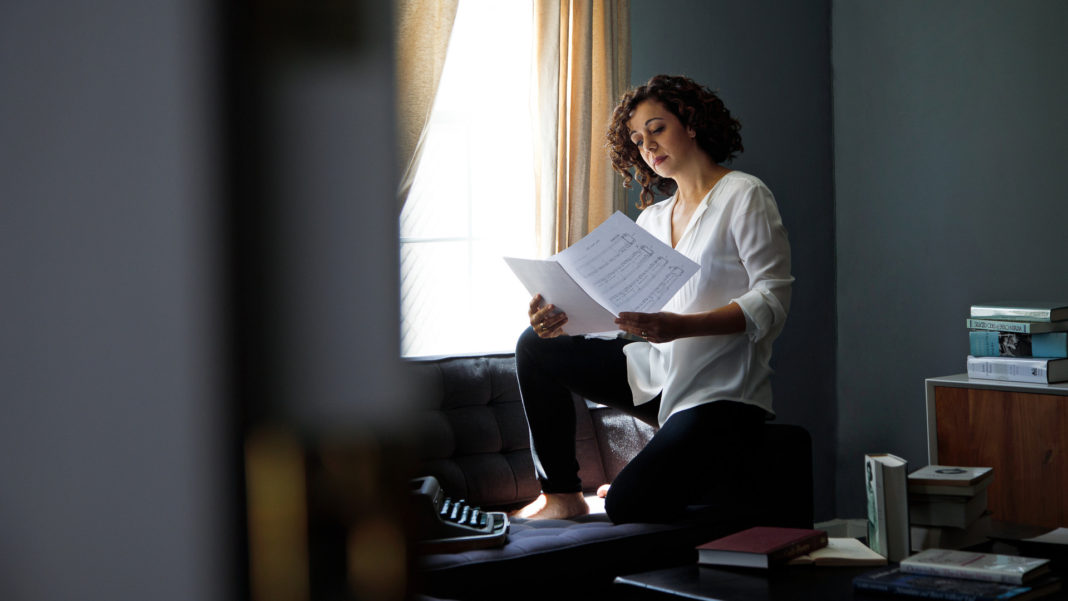“I have always known that audiences are way smarter than we think they’ll be. I have confidence that when they walk into a place, they come in to hear someone like me that they are willing to come into this world I set up.” So says singer/songwriter Luciana Souza about her concerts.
Audiences will share that world on stage with Souza at The Soraya in Northridge on Friday and Saturday night. These concerts will find her singing her album The Book of Longing in its entirety along with other songs from her over 20-year solo recording career.
Souza was born in São Paulo, Brazil. Her career has found her singing standards, Brazilian music and collaborating with classical composers such as Osvaldo Golijov. (She recently performed his work, Oceana, a work written for her, with the Los Angeles Master Chorale.) Attempting to define her by one style or another is a pointless endeavor.
Last week I spoke by phone with Souza about The Book of Longing, her newfound appreciation of silence and about her hope for the future.
Since you first recorded The Book of Longing, an album for which you wrote all the songs using your own poetry or that of others, how has your relationship to the songs and the poems that inspired them evolved?
It’s so interesting. When I make a record it’s a mysterious thing. Two songs have really become more meaningful to me. I haven’t performed Tonight or A Life live. A Life is a poem by Leonard Cohen and Tonight is mine. We haven’t done them live because they haven’t felt good in the sequence. You have to think about sequencing a show, contrast, telling a story. The songs that I have performed that have meant a lot more to me, These Things is one of them. And Paris. Every time I sing them, I’m not saying those because of the melody I wrote, but the words. Every time I sing them I feel differently every time. I want to say every song is that way, but those two songs feel different.
Much has been made about the quiet nature of The Book of Longing. As a songwriter, poet and singer, how do you find the moments where pauses and silence function to the benefit of the song more than words might?
As I’m writing the music I can control it. When I’m performing live and I’m dealing with jazz musicians, and I think of myself as a jazz singer, the pauses may be longer. I enjoy not knowing and this unexpected thing that will happen; however quiet or loud we go. I think you’ll see that dynamic range in concert.
In a 2018 interview for melminter.com you said you had been searching for this truth about your work, yourself and how you live. You continue to say it took hitting 50 to get there. What new truths have you discovered since that time?
I think that hitting 50, you just care less about certain things or some things take a difference place or dimension. I used to think for example being on the road was really important. Now that I have a richer family life with a child, I feel other parts are more important. Community is more important to me nowadays. And my musical community is still really rich. I love silence more than I used to. And slow things. It allows for more introspection and something for me that keeps the mystery and privacy that I crave so much.
Have you started work on a new solo album? If so, how do you follow-up a project like The Book of Longing?
I’m working on a solo project that I hope to release next year. That will be more geared to the Brazilian repertoire. That may change. The Book of Longing was going to have some non-original songs. In talking to Larry (Klein, her producer and husband) he said I should go back and write more. The beauty of having a collaborator like Larry, who understands me and the path of my career, is he can push me into places of discomfort for me and in the end I loved the results of the record.
You’ve recorded The Book of Chet and The Book of Longing. If fifty years in the future someone recorded The Book of Souza, what do you think that would look and sound like?
I think it would be eclectic. It would be wordless and Brazilian. I don’t know. It would have music that I would describe as a sense of humanity – how the human voice can travel to these different places.
Emily Dickinson, whose poem We Grow Accustomed to the Dark inspired one of the songs on The Book of Longing, wrote in Poem 314: “Hope is the thing with feathers that perches in the soul and sings the tunes without the words and never stops at all.” In the chaos that is the world in 2020, where does your hope live and how will that infuse the work you do going forward?
I think we’ve been here in terms of dark times. I know we have. Somehow people shining a light have taken us to a better place. I feel we are in a very dark time and very troubled and a lot of us are alert to that and more are waking up to that. I think we are being told now that we are all of this planet. My hope is that most of us will wake up and look around and take action. For me it might be writing new music, or recycling more or using less and being more conscious about that. More of us will wake up more, see more things and do more.
Photo of Luciana Souza by Anna Webber/Courtesy of lucianasouza.com











